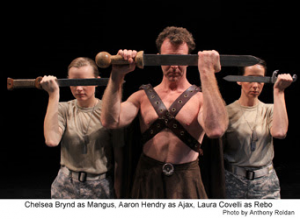The Mission Statement for the Not Man Apart Physical Theatre Ensemble makes for a very interesting read. Among other goals they want to bring the worlds of Dance and Theatre closer together while honoring the power of the spoken work. They want to create highly athletic and innovative theatrical events which are both life affirming and consciousness expanding. They want to reexamine the classics of literature and our everyday world through a visceral interpretation. After my first experience with them, the currently running Ajax in Iraq, I feel they have achieved all those goals. Their past productions included very radical adaptations of Shakespeare’s Pericles and Titus Andronicus, seldom performed works from the prolific playwright.
In Ajax, John Farmanesh-Bocca’s direction is innovative and spell-binding; your eyes always have something to watch and your ears are likewise engaged. The choreography by Farmanesh-Bocca, Jones Welsh and NMA Company is athletically performed by a cast of 16 eager performers. They portray US Army soldiers as well as a Greek chorus, mythological beings and flesh and blood creations. The cast is uniformly fine; there are no standouts but there are no embarrassments on the stage either. Jessica Kohn’s lighting design is a major plus for the production. Adam Phalen’s sound design, with musical underscoring for most scenes, is a bit too loud and intrusive at times and could be dialed back a notch or two so the dialogue can be heard clearly.
The problem with Ajax in Iraq, a mash-up of Sophocles’ tragedy with the ongoing tragedy of sexual harassment in the military, is Ellen McLaughlin’s script. At nearly two hours in length with no intermission, it is about 30 minutes too long. The two musical numbers that end the show could easily be cut and not missed. McLaughlin often repeats herself and her preaching gets a bit shrill at times. Her thesis that the men who fight wars seldom know why they are fighting is spot on. The Trojan War wasn’t really fought because of an unfaithful wife. There was hurt pride and a lust for power and wealth involved. The same is true for the 2003 invasion of Iraq. A son, who happened to be the U.S. President, wished to avenge his father’s honor from an earlier failure to achieve similar goals. As one the characters in the play says, “He invaded the wrong country after 9/11.” There were never any Weapons of Mass Destruction but there was plenty of oil and other natural resources to exploit.
It’s quite a further stretch to accept McLaughlin’s comparison of Ajax to a raped female soldier in Iraq. Ajax’s betrayal by the ruling Greek generals in awarding the fallen Achilles’ armor to Odysseus rather than to Ajax just isn’t the same as male officers taking sexual advantage of female enlistees. Ajax is driven mad by the goddess Athena when he seeks to wreak vengeance on his commanders and in disgrace chooses to fall on his sword rather than live in shame and dishonor. AJ, the soldier constantly raped by her commanding Sergeant, also chooses suicide over her shame. It would seem AJ had more options available to her and never really seeks revenge on her commander. The denouement just feels manipulative rather than organic. Another major script problem is the character of Athena, the Greek goddess of “just warfare” among many other things. McLaughlin gives her a modern makeover. Athena’s wisecracking demeanor is probably meant to be an easy bridge to today’s audiences but she just turned this viewer off. Her vibe was totally out of whack with both the Greek tragedy of Ajax and the modern tragedy of women in the military. Do playwrights no longer have access to dramaturges?
The Miles Memorial Playhouse, 1130 Lincoln Blvd. in Santa Monica. Ends June 1. www.notmanapart.com









